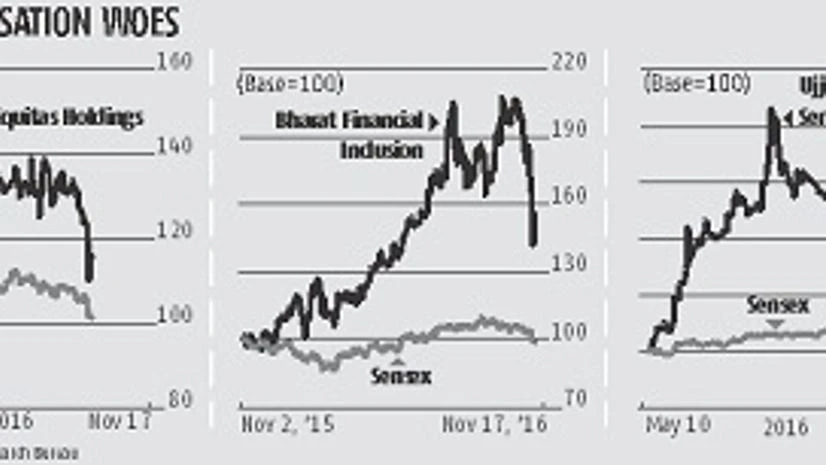The ongoing process of demonetisation will substantially impact the business of micro finance institutions (MFIs) such as Bharat Financial Inclusion (BFIL, the erstwhile SKS Microfinance), Equitas Holdings and Ujjivan Financial Services, as cash forms a significant part (almost entirely in some cases) of their lending and collection.
Other MFIs, too. One of the few new banks in the system, Bandhan, has suspended its micro credit disbursements till November 19. The bank, like peers Equitas and Ujjivan (which have bagged the Small Finance Bank licence), continues to be a prominent player in the MFI space and is likely to feel the heat as collections and disbursements to this segment get impacted.
Despite this positive, demonetisation will impact these companies’ disbursements, collections and asset quality in the current and next quarter, say analysts. However, most of them also believe this is a short-term crisis and the long-term prospects of these companies are intact.
Also Read
“While the BFIL stock will likely remain volatile in the near term, we see the current situation more as an administrative hassle than a structural threat to the business model (like the Andhra Pradesh crisis a few years ago, which the organisation survived),” write analysts at Morgan Stanley, in a recent report on the company. Rating agency India Ratings and Research, too, believes demonetisation is likely to affect MFIs across the country, albeit temporarily. Though delinquencies could go up for these entities in the near term, it is unlikely to be a permanent or structural problem. This is because unlike the Andhra crisis, it is a transition problem (to possibly a cash-less system) and not worsening debt-servicing discipline of borrowers which will push up bad loans. “MFIs’ borrowers are expected to reprioritise their expenses on account of cash flow mismatches, leading to higher overdues for MFIs. Moreover, demonetisation indicates lack of diversification in MFIs’ borrower profiles,” believes India Ratings.
In fact, this sector stands to gain in the longer term as many unorganised players might struggle in a more formal system. “Over the medium-to-long term, organised MFI players stand to benefit, as informal channels will find it difficult to do business with ease,” says Gautam Duggad, head of research, Motilal Oswal Securities.
The Microfinance Institutions Network has made a representation to the Reserve Bank for allowing MFIs to accept the older, demonetised currency notes. A positive development on this could ease the burden of MFIs. India Ratings believes most MFIs have liquidity to meet debt obligations for 30-60 days in the event of business disruption. If money flow does not fully normalise by the fourth quarter of FY17, Tier-1 capital of few MFIs could come close to regulatory minimum levels, it estimates. Though this is a potential risk, most experts believe the money flow should normalise in the next couple of quarters.
Overall, after the recent correction, the three stocks are trading below their historical average valuations and offer an attractive entry point. While BFIL is trading at 2.6 times the FY18 estimated book value, this metric stands at 2.2 and 2.1 times, respectively, for Equitas and Ujjivan. BFIL’s valuation premium is justified, as it is a pure-play on the high margin, high-growth potential MFI segment. While the other two companies also have sound prospects, their near-term growth, profitability and return ratios could come down as they adopt the SFB business model.
READ OUR FULL COVERAGE ON THE MODI GOVT'S DEMONETISATION MOVE
READ OUR FULL COVERAGE ON THE MODI GOVT'S DEMONETISATION MOVE

)
